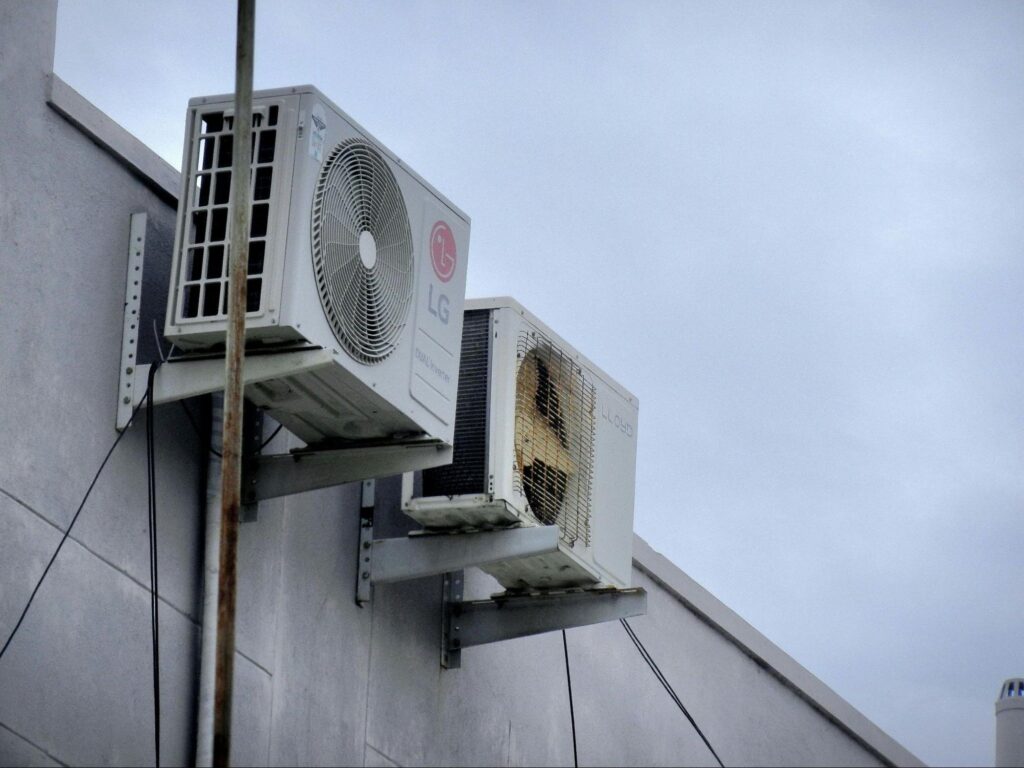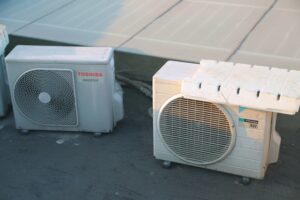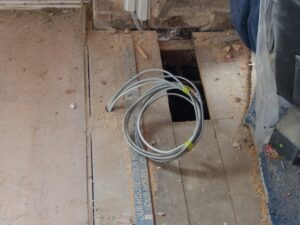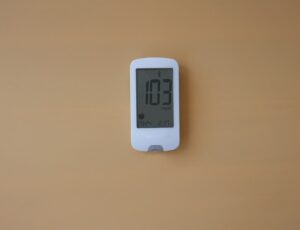When was the last time you checked your AC filter?
If you can’t remember, it might be time for a replacement!
Replacing your AC filter regularly isn’t just about keeping the air clean; it’s also about ensuring your HVAC system runs smoothly and efficiently. A clean filter improves airflow, lowers energy bills, and extends the lifespan of your system.
But how often should you really change your AC filter?
The general recommendation is every 1 to 3 months, but it depends on factors like your usage, whether you have pets, and the air quality around you. A simple replacement can make a noticeable difference in your home or office comfort.
At Excel Mechanical, we believe in providing solutions that keep your HVAC system running at peak performance. Our team ensures you receive exceptional service, tailored to your specific needs and budget. Whether residential or commercial, we’re committed to delivering quality and value.
In this blog, we will cover:
- The importance of regularly replacing your AC filters for optimal air quality and energy efficiency.
- How to choose the right filter for your system and lifestyle.
- Signs that it’s time to replace your AC filter to avoid system inefficiencies.
By taking the small step of replacing your AC filter regularly, you can save money, breathe easier, and improve the overall performance of your system.
Let’s dive into the details and ensure you take the best care of your AC!
Importance of Regular AC Filter Replacement
Replacing your AC filter regularly is crucial for maintaining good air quality in your home.
A clean filter traps dust, pollen, and other particles that can affect your health. Dirty filters can cause allergens to circulate, making it harder for those with allergies or asthma.
Regular filter replacement also helps your AC system run efficiently. When filters are clogged, your system must work harder, increasing energy and utility bills. Ensuring your filters are clean can keep your energy costs down.
Neglecting to replace your filters can lead to costly repairs. Dust and debris can build up inside the unit, causing it to overheat or break down. Regular maintenance, like changing the filters, can prevent these issues and extend the life of your AC.
Understanding AC Filter Types
Choosing the right air filter for your AC is crucial for maintaining air quality and efficiency. Different filters offer various benefits, so it’s essential to understand what each type can do for your home or business.
Fiberglass Filters
Fiberglass filters are the most basic type and are often the least expensive.
They are made from layered fiberglass fibers over a frame. These filters are designed to protect your HVAC system rather than significantly improve indoor air quality.
They are best at catching larger particles like dust and lint. Fiberglass filters need to be replaced more often, typically every 30 days. If you choose this type, you should regularly check and replace them to ensure your system runs smoothly.
Pleated Filters
Pleated filters offer a step up from fiberglass in terms of efficiency.
Made from polyester or cotton folds, these filters capture finer particles such as pollen and pet dander. The pleats increase the surface area, allowing for better filtration without obstructing airflow.
You can expect pleated filters to last about three months under normal conditions. They offer a good balance between cost and performance, making them a popular choice for many homeowners.
HEPA Filters
HEPA filters provide advanced filtration, capturing 99.97% of particles as small as 0.3 microns.
These filters are ideal for those with allergies or respiratory issues. They are commonly used in hospitals and laboratories due to their high efficiency.
While they offer excellent air quality, HEPA filters are not suitable for all HVAC systems because they can restrict airflow. Before using them, ensure your system can handle them.
Washable Filters
Washable filters are reusable and can last several years if maintained properly.
They are made from a sturdy material that allows you to wash and reuse them, making them more environmentally friendly and cost-effective.
These filters capture larger particles and must be cleaned every few months to keep them effective. While convenient, they may not catch smaller particles as effectively as other filter types.
Recommended Replacement Frequency
Replacing air conditioning filters regularly is crucial for maintaining indoor air quality and the efficiency of your system. Different factors, such as household environment and usage, influence how often you should change the filters. Understanding these aspects ensures optimal performance and energy savings.
Standard Recommendations
Typically, you should replace standard AC filters every 60 to 90 days.
This frequency helps maintain air quality and system efficiency. Changing filters more often can be beneficial if you or your family members experience allergies or respiratory issues.
Regular replacement also helps prevent dust buildup and keeps your system running smoothly. It’s a small task that can prevent costly repairs down the road.
Considerations for Allergies and Pets
If someone in your household suffers from allergies or you have pets, you might need to change filters more often. Pet hair and dander can clog filters quickly, reducing airflow and air quality.
Replacing filters every 30 to 60 days is often recommended for homes with pets. This change helps control allergens and hair. The more pets you have, the more frequently the filters need changing.
This ensures everyone can enjoy comfortable, fresh air.
Impact of Usage and Environment
Your environment and how much you use your AC also influence filter replacement frequency.
Consider more frequent changes if you live in a dusty area or use your HVAC system regularly. High usage can lead to faster filter clogging. In a less dusty environment or with moderate use, the standard 60 to 90-day replacement is usually sufficient.
Being mindful of these factors helps maintain air quality.
Signs Your AC Filter Needs Replacement
Now, let’s talk about the signs that your AC filter needs replacement.
1. Reduced Airflow
If you notice weak airflow from your vents, it might be time to check your AC filter. A dirty filter can block air, making it difficult for your system to circulate cool air effectively. This can lead to uneven room temperatures and decreased comfort.
2. Increased Dust and Allergens
When your AC filter gets clogged, particles like dust and pollen can bypass the filter and circulate throughout your home. The filter could be the issue if you’re noticing more dust on surfaces or experiencing heightened allergy symptoms.
3. Higher Energy Bills
A neglected filter can cause your air conditioning system to work harder than needed, leading to energy consumption spikes. If your utility bills are climbing unexpectedly, consider inspecting your filter.
4. Strange Odors
A musty or unpleasant odor from your vents can indicate a filthy filter. Over time, accumulated debris and moisture can lead to mold growth, which smells bad and can affect indoor air quality.
5. Visible Dirt on the Filter
Check the filter itself. If it appears gray or covered in dirt, it’s a clear sign that a replacement is overdue. Regular visual inspections help ensure optimal performance.
Consequences of Neglecting Filter Replacement
Now, let’s dive into the real consequences of neglecting filter replacement.
- Reduced Efficiency: Neglecting to replace your AC filters leads to reduced efficiency. Dust and debris build up, making your system work harder. This can increase your energy bills and shorten the lifespan of your unit.
- Poor Air Quality: Dirty filters can impact indoor air quality. They allow pollutants like dust, pollen, and mold spores to circulate in your home, aggravate allergies, and cause respiratory issues.
- Increased Wear and Tear: Ignoring filter changes can cause increased wear and tear. Blocked airflow forces your AC to overwork, leading to possible mechanical failures. Regular maintenance can help prevent costly repairs.
- Potential for System Failure: Without timely replacement, there’s a higher risk of system failure. A clogged filter can trigger system shutdowns or major breakdowns. This may require a complete AC replacement sooner than expected.
Steps for Replacing Your AC Filter
- Step 1: Turn Off Your AC System: Make sure your AC is turned off before starting. This ensures safety and prevents dust and debris from circulating during the process.
- Step 2: Locate the Filter: Find the location of your AC filter. It might be behind a return air grille on a wall or ceiling, or inside the blower compartment of your unit.
- Step 3: Remove the Old Filter: Carefully remove the old filter and check its condition. If it’s dirty or clogged, it’s time for a replacement.
- Step 4: Choose the Right Filter: Check the size stamped on the edge of your old filter to get a new one that fits correctly. Filters come in various types, like fiberglass, pleated, or high-efficiency.
- Step 5: Insert the New Filter: Place the new filter in the same direction as the old one. An arrow on the filter frame usually indicates the direction of airflow.
- Step 6: Secure the Filter: Once the new filter is in place, ensure it’s secured properly to avoid movement.
- Step 7: Turn Your System Back On: After replacing the filter, turn your AC system back on and enjoy a more efficient cooling experience.
For top-quality HVAC and plumbing services, look no further than Excel Mechanical. We provide personalized systems tailored to your specific needs and budget. Our team is committed to exceptional quality and value for residential or commercial purposes.
Choosing the Right AC Filter for Your Needs
The right AC filter maintains good air quality and system efficiency. Here are a few factors to consider:
1. Filter Types
- Fiberglass: Affordable and disposable. Good for basic protection.
- Pleated: Captures more particles. Lasts longer than fiberglass.
- Electrostatic: Washable and reusable. Attracts dust with static charge.
- HEPA: Captures 99% of pollutants. Best for allergy sufferers.
2. MERV Ratings
Filters have a Minimum Efficiency Reporting Value (MERV) rating. A higher MERV means better filtration.
- MERV 1-4: Basic dust and pollen.
- MERV 5-8: Mold spores and pet dander.
- MERV 9-12: Fine particles. Great for homes with pets or smokers.
- MERV 13-16: Helps control allergens.
3. Consider Your Lifestyle
Think about your specific needs. A HEPA filter or high MERV rating might be necessary if someone in your home has allergies or asthma. For general use, a pleated filter balances performance and cost.
Maintaining Your AC Filter for Optimal Performance
It is important to regularly maintain your AC filter to keep it running smoothly and efficiently. This involves cleaning, proper installation, and checking air flow. These steps not only improve air quality but also help extend the life of your system.
Regular Cleaning
Regularly cleaning your AC filter helps prevent dust and dirt from blocking air flow. This can improve your unit’s efficiency and reduce energy costs. Depending on usage and the environment, you should check and clean your filter every 1 to 3 months.
Steps for Cleaning:
- Turn off the AC unit.
- Remove the filter carefully.
- Use a vacuum or rinse with water to remove debris.
- Let it dry completely before reinstalling.
A clean filter ensures optimal performance and comfort in your home. Regular attention helps you avoid unnecessary repairs or replacements.
Proper Installation
The correct installation of your AC filter is crucial for effective functioning. An improperly installed filter can let dirt into your system, reducing performance and potentially causing damage. Make sure to position the filter according to the manufacturer’s directions.
Installation Tips:
- Ensure a snug fit: The filter should sit securely and cover the entire opening.
- Follow the airflow arrows: These guide you on correct placement.
- Replace damaged filters: Using a damaged filter can harm your system’s efficiency.
Taking these precautions helps extend the unit’s lifespan and maintains the air quality in your home.
Monitoring Air Flow and Filter Condition
Monitoring air flow and the condition of your filter is crucial for AC maintenance. Check for reduced air flow, indicating a dirty or clogged filter. If the filter appears worn or damaged, replace it immediately to prevent strain on your system.
Signs of Trouble:
- Weak airflow through vents
- Increased energy bills
- Dust accumulation near vents
By staying vigilant, you protect your AC and ensure a comfortable environment.
Professional Maintenance and Filter Replacement
Regular professional maintenance of your AC system is essential. It helps keep your system running efficiently and can prevent costly repairs. This includes checking and replacing filters as needed.
Why Professional Maintenance Matters:
- Efficiency: Professionals ensure that your system uses energy effectively, saving you money on bills.
- Longevity: Regular care extends the life of your system, avoiding premature replacements.
Filter Replacement Tips:
- Frequency: Replace filters every 1-3 months based on usage and filter type.
- Signs You Need Replacement: Check for reduced airflow, increased dust, or unusual odors.
Excel Mechanical provides exceptional HVAC and plumbing services focusing on quality and value. Your system is in capable hands with skilled technicians, ensuring it meets your needs and budget. Rely on us for both residential and commercial needs. You can trust us for thorough maintenance, making your home or business comfortable year-round.
Frequently Asked Questions
You’ve learned how important regular AC filter replacements are for maintaining your system’s efficiency and keeping your indoor air quality in check. But with all the details, you might have a few questions. Let’s dive into some of the most common ones to help you stay on track and ensure your AC is running smoothly.
What are the signs that my AC filter needs replacing?
You might notice increased dust around your home, reduced airflow from vents, or your system running more often. These signs indicate it’s time to change your filter.
Does the frequency of changing AC filters vary with pet ownership?
If you have pets, you’ll likely need to replace your AC filter more frequently. Pet hair and dander can quickly clog filters, reducing efficiency and air quality.
How does the climate or season affect the replacement interval of AC filters?
In regions with heavy pollen or dust, or during peak usage seasons, your AC filter may need to be changed more often. Seasonal changes can affect filter lifespan and how hard your AC system must work.
Can replacing my AC filter more frequently lower my energy bill?
Yes, changing a dirty filter can improve airflow and efficiency, potentially reducing energy costs. With a clean filter, your system doesn’t work as hard, saving energy and extending its life.
What potential problems can arise from not regularly changing my air conditioner filter?
Failing to change your AC filter regularly can lead to restricted airflow, increased energy usage, and poor indoor air quality. Long-term neglect can strain the system, potentially causing it to fail.
How does the type of AC filter I use influence the replacement schedule?
Filter types have varying lifespans. Basic fiberglass filters require frequent changes, while pleated or high-efficiency filters can last longer. Always check the manufacturer’s recommendations for guidance.




